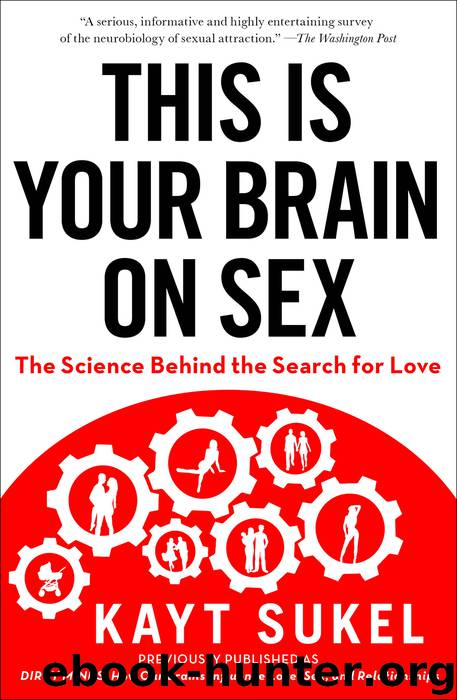This Is Your Brain on Sex by Kayt Sukel

Author:Kayt Sukel
Language: eng
Format: epub
Publisher: Free Press
Developing Addiction
Unexpected rewards lead to the release of dopamine in the basal ganglia, which facilitates learning. The more rewarding a particular stimulus may be, the more likely you will be to see an increase in the particular behavior to get it. We often talk about the basal ganglia as the reward system in the mesocortical limbic circuit. Craig Ferris, the Northeastern University researcher who first demonstrated that rats prefer their own pups to cocaine, told me that it pays to be a little more specific when you talk about this particular circuit. “This pathway is not really a reward system per se,” he explained. “It’s more a system for motivation, essentially. It’s involved with evaluating the risks and the rewards involved with certain behaviors, as well as the predictability of things that may come if you engage in a particular behavior.”
Risks and rewards: that’s important. Just as no good deed goes unpunished, no good reward—be it sex, food, or potential slot machine payout—comes without some risk. One might argue that risk is what gives a particular behavior that little extra oomph, making it exciting enough to want so badly. The mesocortical limbic circuit, involving those dopamine-rich basal ganglia, is not just primed to help you get extra food or laid more often. It is attuned to understanding the risks involved with a particular reward and helping you make the right decisions in order to maximize that reward. When that circuit is out of whack, you may end up with an addiction.5
“Addiction is basically a reward process spinning out of control,” said Schultz. “Not everyone becomes addicted, that is important. We don’t know why some do become addicted and others do not. But in those who do, it’s clear there is some flip in the machinery where you need more of a particular reward than you usually get and can’t properly assess the risks involved with getting it. That flip is linked to the dopamine system in some way, with the release of too much of it into the brain. Ultimately those high levels of dopamine lead to plasticity in the brain, to changes in the reward processing system that result in no longer being able to make sense of the dopamine signals or how they may relate to the outside world in the proper way.”
The long and the short of it is that the reward processing system is compromised by addiction, giving a particular reward a strong value signal, while downplaying the associated risk signal. Over time the compromised reward processing system takes a once positive reward and turns it into a grave negative. Researchers do not know what may cause this wrench in the works (both nature and nurture appear to play a role), but once the switch is thrown, the effects can be devastating.
Download
This site does not store any files on its server. We only index and link to content provided by other sites. Please contact the content providers to delete copyright contents if any and email us, we'll remove relevant links or contents immediately.
The Art of Thinking Clearly by Rolf Dobelli(10455)
The 5 Love Languages: The Secret to Love That Lasts by Gary Chapman(9792)
Mindhunter: Inside the FBI's Elite Serial Crime Unit by John E. Douglas & Mark Olshaker(9324)
Becoming Supernatural by Dr. Joe Dispenza(8204)
Nudge - Improving Decisions about Health, Wealth, and Happiness by Thaler Sunstein(7694)
The Road Less Traveled by M. Scott Peck(7594)
Mastermind: How to Think Like Sherlock Holmes by Maria Konnikova(7324)
Enlightenment Now: The Case for Reason, Science, Humanism, and Progress by Steven Pinker(7306)
Win Bigly by Scott Adams(7184)
The Way of Zen by Alan W. Watts(6601)
Factfulness: Ten Reasons We're Wrong About the World – and Why Things Are Better Than You Think by Hans Rosling(4737)
The State of Affairs by Esther Perel(4712)
Gerald's Game by Stephen King(4642)
Man's Search for Meaning by Viktor Frankl(4586)
The Confidence Code by Katty Kay(4251)
Thinking in Bets by Annie Duke(4218)
The Healing Self by Deepak Chopra(3568)
Hidden Persuasion: 33 psychological influence techniques in advertising by Marc Andrews & Matthijs van Leeuwen & Rick van Baaren(3559)
The Worm at the Core by Sheldon Solomon(3486)
